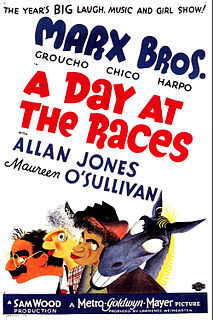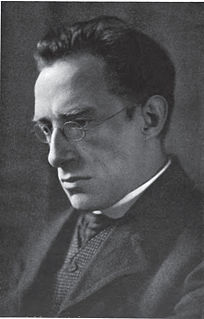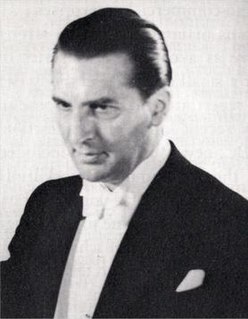Related Research Articles

Steve Harley & Cockney Rebel are an English glam rock band from the early 1970s. Their music covers a range of styles from pop to progressive rock. Over the years they have had five albums in the UK Albums Chart and twelve singles in the UK Singles Chart.

A Day at the Races (1937) is the seventh film starring the Marx Brothers, with Allan Jones, Maureen O'Sullivan and Margaret Dumont. Like their previous Metro-Goldwyn-Mayer feature A Night at the Opera, this film was a major hit.

Albert William Ketèlbey was an English composer, conductor and pianist, best known for his short pieces of light orchestral music. He was born in Birmingham and moved to London in 1889 to study at Trinity College of Music. After a brilliant studentship he did not pursue the classical career predicted for him, becoming musical director of the Vaudeville Theatre before gaining fame as a composer of light music and as a conductor of his own works.

Walter John "Jack" Buchanan was a Scottish theatre and film actor, singer, dancer, producer and director. He was known for three decades as the embodiment of the debonair man-about-town in the tradition of George Grossmith Jr., and was described by The Times as "the last of the knuts." He is best known in America for his role in the classic Hollywood musical The Band Wagon in 1953.
Antony Hopkins CBE was a composer, pianist and conductor, as well as a writer and radio broadcaster. He was widely known for his books of musical analysis and for his radio programmes Talking About Music, broadcast by the BBC from 1954 for approaching 40 years, first on the Third Programme, later Radio 3, and then on Radio 4.

Allen Curtis Jenkins was an American character actor and singer who worked on stage, film, and television.

Steve Harley is an English singer and songwriter, best known as frontman of the rock group Cockney Rebel, with whom he still tours, albeit with frequent and significant personnel changes.

Joseph Charles Holbrooke was an English composer, conductor, and pianist.

Ras Prince Monolulu, whose real name was Peter Carl Mackay, was a horse-racing tipster, and something of an institution on the British racing scene from the 1920s until the time of his death. He was particularly noticeable for his brightly coloured clothing; as a tipster, one of his best known phrases was the cry "I gotta horse!", which was subsequently the title of his memoirs.

Martin Edward Fallas Shaw (1875–1958) was an English composer, conductor, and theatre producer. His over 300 published works include songs, hymns, carols, oratorios, several instrumental works, a congregational mass setting, and four operas including a ballad opera.

Thomas Kirby Walls, known as Tom Walls, was an English stage and film actor, producer and director, best known for presenting and co-starring in the Aldwych farces in the 1920s and for starring in and directing the film adaptations of those plays in the 1930s.

Stanford Robinson OBE was an English conductor and composer, known for his work with the BBC. He remained a member of the BBC's staff until his retirement in 1966, founding or building up the organisation's choral groups, both amateur and professional.

The Boatswain's Mate is an opera in one act written by British composer and suffragette Ethel Smyth in 1913–14 set to her own libretto, which was based on a story of the same name by W. W. Jacobs.

Frederic William Austin was an English baritone singer, a musical teacher and composer in the period 1905–30. He is best remembered for his restoration and production of The Beggar's Opera by John Gay and Johann Christoph Pepusch, and its sequel, Polly, in 1920–23. Austin was the older brother of the composer Ernest Austin (1874–1947).
There have been three choirs named The BBC Chorus in the history of the British Broadcasting Corporation.

Red Peppers, described as "an interlude with music", is a short comic play in two scenes by Noël Coward. It is one of ten short plays that make up Tonight at 8.30, a cycle written to be performed in groups of three plays across three evenings. The original production, starring Coward and Gertrude Lawrence played in a pre-London tour, and then the West End, and finally New York, in 1935–1937. Red Peppers has been revived periodically and has been adapted for the cinema and television.
Alfred Reynolds (1884–1969) was a composer of light music for the theatre.

Clapham and Dwyer were a British comedy duo popular in the 1920s and 1930s, comprising Charlie Clapham and Bill Dwyer.

Frederick Ranalow was an Irish baritone who was distinguished in opera, oratorio, and musical theatre, but whose name is now principally associated with the role of Captain Macheath in the ballad opera The Beggar's Opera, which he sang close to 1,500 times. He was also a minor film actor and writer of songs.

Arlette is a 1917 operetta in three acts by Austen Hurgon and George Arthurs with lyrics by Adrian Ross and Clifford Grey. Produced by George Grossmith Jr. and Edward Laurillard it was adapted from the French with music by Jane Vieu, Guy Le Feuvre and Ivor Novello. It opened at the Shaftesbury Theatre in London on 6 September 1917 where it ran for 260 performances. It starred Winifred Barnes, Joseph Coyne and Stanley Lupino.
References
- 1 2 3 Dunhill, Thomas F., "The Music of Derby Day" (1 May 1932). The Musical Times, 73 (1071): pp. 415-416.
- ↑ Lubbock, Mark, "The Music of 'Musicals'" (September 1957). The Musical Times, 98 (1375): pp. 483-485.
- ↑ Traubner, Richard: Operetta: a theatrical history Routledge, 2003 ISBN 978-0-415-96641-2 (p. 355)
- 1 2 Gänzl, Kurt: British Musical Theatre, vol. 2 (1915-1984), Oxford: OUP, 1987 ISBN 0-19-520509-X (pp. 364-369)
- 1 2 3 Radio Times Television Supplement, 2 July 1937. London: BBC Publications
- ↑ "To-Day's Wireless", Dundee Evening Telegraph (May 30 1932): pp. 9.
- ↑ "Audax" (pseudonym), "Wireless Notes" (July 1934). The Musical Times, 75 (1097): pp. 613-615.